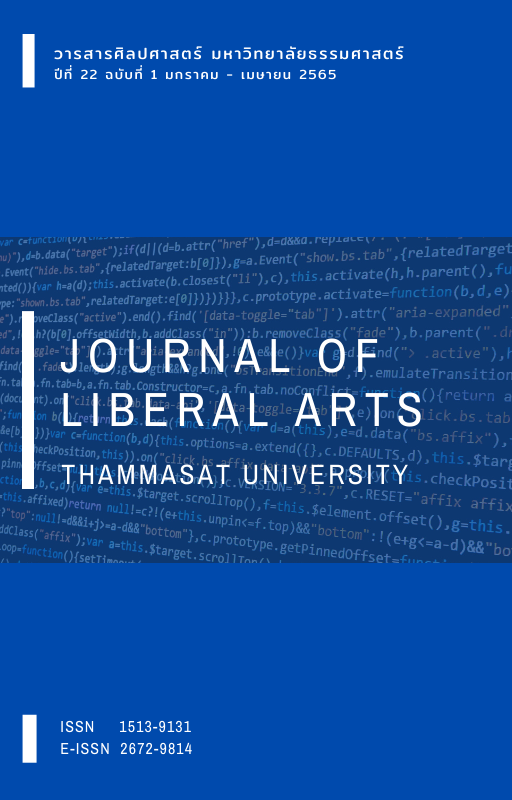การทบทวนปฏิบัติการทางการศึกษาและบทบาทของครูอาจารย์ผ่านศาสตร์การสอนเชิงวิพากษ์แนวนิเวศบนฐานชุมชนท้องถิ่น: กรอบแนวคิดเพื่อการปฏิรูปการศึกษาในระหว่างและหลังสถานการณ์โรคระบาด
Main Article Content
บทคัดย่อ
บทความนี้มีวัตถุประสงค์เพื่ออภิปรายประเด็น ดังนี้ 1) ขบวนการเคลื่อนไหวทางสังคมแนวใหม่: พื้นที่ปฏิบัติการของศาสตร์การสอนเชิงวิพากษ์ 2) จุดเปลี่ยนของศาสตร์การสอนเชิงวิพากษ์: สู่ศาสตร์การสอนเชิงวิพากษ์แนวนิเวศ และ 3) ศาสตร์การสอนเชิงวิพากษ์แนวนิเวศ: การสอนที่เป็นไปได้จริงในระหว่างและหลังสถานการณ์การระบาดครั้งใหญ่ การนำเสนอดังกล่าวมีที่มาจากการที่ผู้เขียนได้เรียนรู้จากขบวนการเคลื่อนไหวทางสังคมร่วมสมัย อาทิ การประท้วงเรียกร้องสิทธิของกลุ่มคนผิวดำ การเคลื่อนไหวด้านสังคมและสิ่งแวดล้อม และการศึกษาเชิงวิพากษ์ที่มีต่อสภาวะความทุกข์ทางสังคมในช่วงก่อนและระหว่างการระบาด ผู้เขียนได้นำเสนอกรอบแนวคิดศาสตร์การสอนเชิงวิพากษ์แนวนิเวศเพื่อการสอนในระดับอุดมศึกษาที่จะหนุนเสริมให้นักการศึกษาก้าวพ้นไปจากแนวคิดที่ยึดเอามนุษย์เป็นศูนย์กลาง อันจะนำไปสู่การปฏิรูปการศึกษาโดยมีชุมชนท้องถิ่นเป็นแนวร่วมเพื่อสร้างการไตร่ตรองเชิงวิพากษ์ ความหลากหลาย และมีความยั่งยืน
Downloads
Article Details

อนุญาตภายใต้เงื่อนไข Creative Commons Attribution-NonCommercial-NoDerivatives 4.0 International License.
เอกสารอ้างอิง
โกมาตร จึงเสถียรทรัพย์. (2562). ความเป็นมนุษย์ในโลกดิจิทัล. ปาฐกถาเปิดการประชุมวิชาการมานุษยวิทยา ครั้งที่ 13 หัวข้อ “มนุษย์ในโลกดิจิทัล”. ศูนย์มานุษยวิทยาสิรินธร (องค์การมหาชน).
ชนกพร ชูติกมลธรรม. (2563). Material Turn ในสาขาประวัติศาสตร์ ทฤษฎี Actor-Network กับแนวคิดวัตถุในฐานะผู้กระทำการทางประวัติศาสตร์. วารสารศิลปศาสตร์, 20(1), 97-125.
ไชยรัตน์ เจริญสินโอฬาร. (2547). ความขัดแย้ง/การต่อต้านขัดขืน: “คิดใหม่ ทำใหม่”. วารสารสังคมศาสตร์, 35(1), 256-303.
วศินรัฐ นวลศิริ. (2563). การสอนวรรณกรรมแนวนิเวศ: การเล่าเรื่องใหม่ผ่านมุมมองของสัตว์. วารสารมนุษยศาสตร์วิชาการ, 27(1), 324-353.
Baldwin, J. (1963). A talk to teachers. The Saturday Review. https://www.zinnedproject.org/materials/baldwin-talk-to-teachers
Basso, K. H. (1996). Wisdom sits in places: Landscape and language among the Western Apache. UNM Press.
Bayley, A. (2018). Posthumanism, Decoloniality and Re-Imagining Pedagogy. Parallax, 24(3), 243-253.
Bell, A. C., & Russell, C. L. (2000). Beyond human, beyond words: Anthropocentrism, critical pedagogy, and the poststructuralist turn. Canadian Journal of Education, 25(3), 188-203.
Bowers, C. A. (2001). Educating for eco-justice and community. University of Georgia Press.
Braslow, S. (2020). Black Lives Matter estimates that as many as 100,000 protesters Gathered in Hollywood on Sunday. Los Angeles Magazine. https://www.lamag.com/citythinkblog/hollywood-protest-sunday/
Buchanan, L., Bui, Q., & Patel, J. K. (2020). Black lives matter may be the largest movement in U.S. History. The New York Times. https://www.nytimes.com/interactive/2020/07/03/us/george-floyd-protests-crowdsize.html
Center for Disease Control. (2020). CDC COVID Data Tracker. https://www.cdc.gov/covid-data-tracker/#cases
Cochran-Smith, M. (2006). Teacher Education and the Need for Public Intellectuals. New Educator, 2(3), 181-206.
Cochran-Smith, M., Feiman-Nemser, S., McIntyre, D. J., & Demers, K. E. (2008). Handbook of research on teacher education: Enduring questions in changing contexts. Routledge.
DeLeon, A. P. (2019). Subjectivities, Identities, and Education after Neoliberalism: Rising from the Rubble. Routledge.
Garrard, G. (2010). Problems and prospects in ecocritical pedagogy. Environmental Education Research, 16(2), 233-245.
Giroux, H.A. (2004). Cultural Studies, Public Pedagogy, and the Responsibility of Intellectuals. Communication and Critical/Cultural Studies, 1(1), 59-79.
Gkiolmas, A. S., & Skordoulis, C. D. (2020). Towards critical environmental education: Current and future perspectives. Springer.
Gottesman, I. (2016). The Critical Turn in Education: From Marxist Critique to Poststructuralist Feminism to Critical Theories of Race. Routledge.
Gruenewald, D. A. (2003). The best of both worlds: A critical pedagogy of place. Educational researcher, 32(4), 3-12.
Gruenewald, D. A., & Smith, G. A. (2014). Place-based education in the global age: Local diversity. Routledge.
Heimans, S. (2015). Taking a “material turn” in education policy research. Education Policy and Contemporary Theory. Routledge.
Jacob, M. M., & RunningHawk Johnson, S. (2020). On Indian ground: A return to Indigenous Knowledge-Generating hope, leadership and sovereignty through education. Information Age Publishing.
Jickling, B., & Sterling, S. (Eds.). (2017). Post-sustainability and environmental education: Remaking education for the future. Springer.
Kahn, R. (2010). Critical pedagogy, ecoliteracy, & planetary crisis: The ecopedagogy Movement. Peter Lang.
Lloro-Bidart, T., & Banschbach, V. S. (2019). Animals in environmental education: Interdisciplinary approaches to curriculum and pedagogy. Springer.
Lupinacci, J. (2020). Teacher education in a dangerous time: (Re)imagining education for diversity, democracy and sustainability. Northwest Journal of Teacher Education, 15(2), 1-14.
Lupinacci, J., Happel-Parkins, A., Turner, R. (2019). Ecocritical Pedagogies for Teacher Education. Encyclopedia of Teacher Education. Springer.
Lupinacci, J., Happel-Parkins, A., & Turner, R. (2018). Ecocritical scholarship toward social justice and sustainability in teacher education. Issues in Teacher Education, 27(2), 3-16.
Martusewicz, R. A. (2019). A pedagogy of responsibility: Wendell Berry for ecojustice education. Routledge.
Martusewicz, R., Edmundson, J., & Lupinacci, J. (2020). EcoJustice education: Toward diverse, democratic, and sustainable communities. Routledge.
McCoy, K., Tuck, E., & McKenzie, M. (2017). Land education: Rethinking pedagogies of place from indigenous, postcolonial, and decolonizing perspectives. Routledge.
McLaren, P. & Houston, D. (2004) Revolutionary Ecologies: Ecosocialism and Critical Pedagogy. Educational Studies, 36(1), 27-44.
Nocella II A.J., C. Drew, A.E. George, S. Ketenci, J. Lupinacci, I. Purdy & J.L. Schatz. (2019). Education for total liberation: Critical animal pedagogy and teaching against speciesism. Peter Lang.
Parker, K., Menasce Horowitz, J., & Anderson, M. (2020). Amid protests, majorities across racial and ethnic groups express support for the Black Lives Matter movement. Pew Research Center: Social & Demographic Trends.
Parveen, N. (2020). Coronavirus crisis “increases suffering of most vulnerable refugees.” https://www.theguardian.com/world/2020/may/18/coronavirus-crisisincreases-suffering-of-most-vulnerable-refugees
Pedersen, H. (2019). The contested space of animals in education: A response to the “animal turn” in education for sustainable development. Educational Sciences, 9(3), 2-11.
Plumwood, V. (2002). Environmental culture: The ecological crisis of reason. Routledge.
Sawchuk, S. (2021). What is critical race theory, and why is it under attack? https://www.edweek.org/leadership/what-is-critical-race-theory-and-why-is-it-under-attack/2021/05
Shiva, V. (1993). Monocultures of the mind: Perspectives on biodiversity and biotechnology. Palgrave Macmillan.
Sonu, D., & Snaza, N. (2015). The Fragility of Ecological Pedagogy: Elementary Social Studies Standards and Possibilities of New Materialism. Journal of Curriculum and Pedagogy, 12(3), 258-277.
Turner, R. J. (2015). Teaching for ecojustice: Curriculum and lessons for secondary and College classrooms. Routledge.
Tyler, M. (2020). I hate the pandemic, but I’m grateful to be rid of grades. Rethinking Schools, 34(4), 18-20.
United Nations. (2020). The social impact of COVID-19. https://www.un.org/development/desa/dspd/2020/04/social-impact-ofcovid-19/
UNICEF (2020). An additional 6.7 million children under 5 could suffer from wasting this year due to COVID-19. https://www.unicef.org/pressreleases/unicef-additional-67-million-children-under-5-could-suffer-wasting-year-duecovid-19
Warren, K. (1990). The power and the promise of ecological feminism. Environmental Ethics, 12(2), 125-146.
Zemblylas, M. (2018). The Entanglement of Decolonial and Posthuman Perspectives: Tensions and Implications for Curriculum and Pedagogy in Higher Education. Parallax, 24(3), 254–267.


